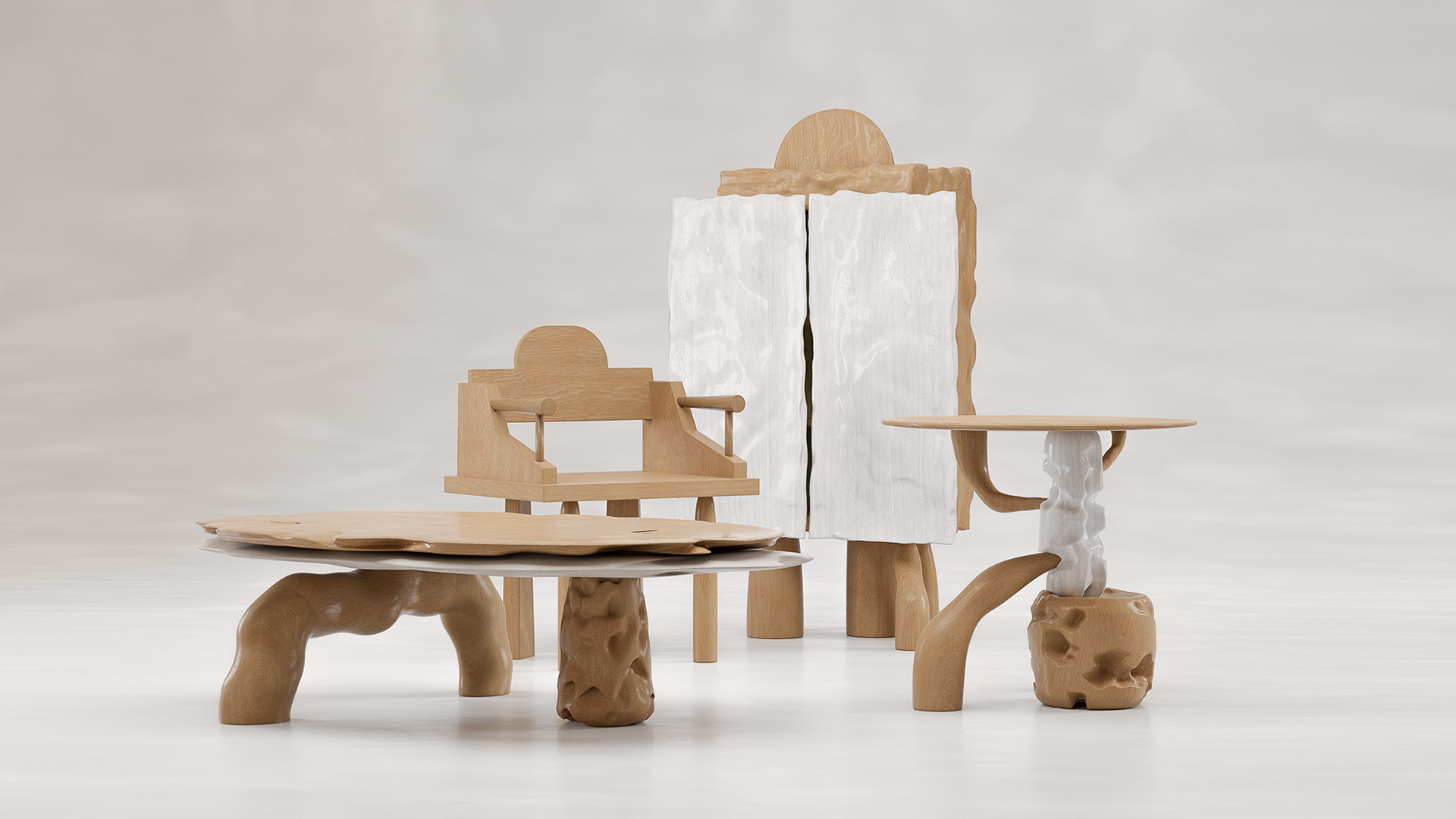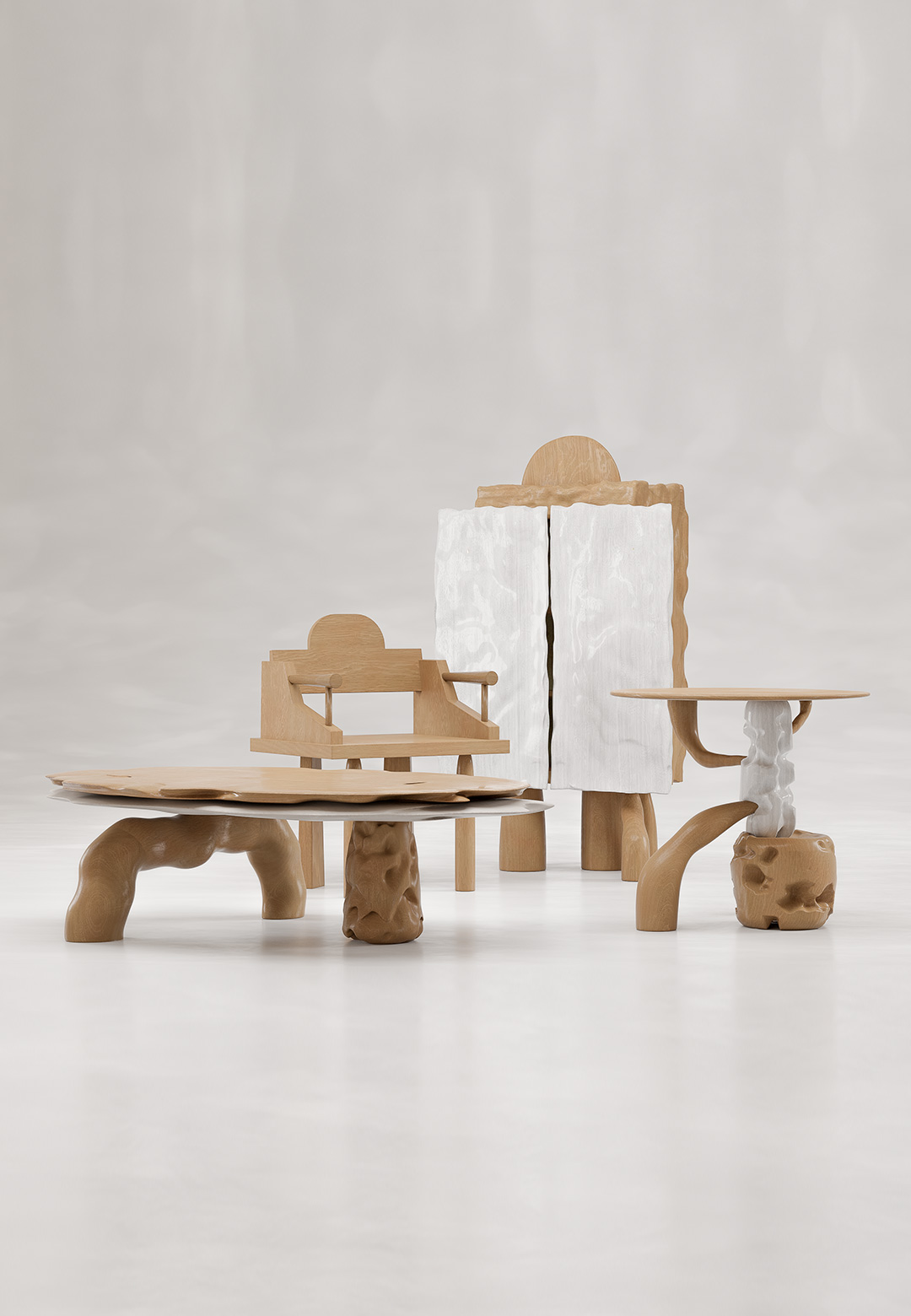“I’m not a designer, I’m a craftsman and a designer. And that’s a totally different paradigm than being a designer, seated at the drawing board,” asserts Benjamin Foucaud, delineating the procedure that guides the creation of furniture and objects shaped by him. In using his hands to build the components of his furniture, Foucaud, who is based in Amiens, France, imbues the pieces with not only his vision for their design but also lets the spontaneity of the moment guide the shape, form, and texture of the final pieces. His latest, the Colorado collection, designed exclusively for art gallery studiotwentyseven, bears testimony to his involved process. Fashioned like animated beings, the undulating texture of the tables and cabinets making up the series evokes images of textured natural entities.
“I’m less driven by ideas than by a physical relation to my work. When I’m designing a piece, I can project myself into doing it. While having an idea, I immediately feel the tools, the cold of the workshop, I assess the pain I will give and the joy I will take from doing that piece,” the French designer and craftsman shares. Foucaud, who has previously worked as a creative director, now uses his experience and expertise to design and build thematic furniture and objects for clients such as Wes Anderson. Although the final designs shaped by him find utilitarian employment, their silhouettes are inspired by Foucaud’s dreams, and his elusive journeys. They are spontaneous, inspire adventure, and a foray into surreal spaces where one can freely imagine and traverse unbridled paths.
Foucaud’s expertise as a cabinetmaker adds another dimension of technical adeptness to his pieces. He is trained to employ the tools and gestures traditionally used to sculpt objects and articles. Engaging in 'hand-to-hand combat' with the material he chooses to play with, Foucaud suffuses a different latent temperament into each of the pieces he sculpts. Since all his designs are guided by a serendipitous process, they defy specific categorization. “I’m aware that a signature style is just an economical constraint (I try to pass through) and I will already deliver very different things in the future. But a claim that I have decided not to choose between craft, design, or even art. That was the starting point,” the French artist shares.
The Colorado collection, too, defies any allocation. Shaped like sculptures, each of which is uniquely produced for a unique proprietor, the pieces manage to make a statement while remaining exclusive and rare, not meant for mass production. “The Colorado collection is not designed over a trend, an aesthetic signature, or a manifestation of my own ego. The pieces don’t answer an industrial question. They are the result of questioning what my hands could do repeatedly that would be unique every time,” he explains.
Foucaud locally sourced French oakwood, pumice stone, steel, plaster of Paris, Blanc de Meudon, shellac, linseed oil, and beeswax to build the Colorado collection. On being asked what his inspiration behind the collection is, the designer shares, “I didn’t have a source of inspiration, as I have never been convinced by the inspiration/creation dialectic. I think it is a social justification of a deeper and more personal dynamic, often unconscious, just to give people the ability to evaluate them as understandable and then valuable. The logic of creation by itself, the fact that a singular idea has come out of the mind of someone unique, that a path has been created in a brain that will never be created again in the universe and that it does now exist should be celebrated enough as pure magic, without having to justify it.”
The collection is the result of Foucaud’s attempts at arranging organically shaped pieces to produce a cohesive object that would be difficult to reproduce in the exact same way, by hand or by machine. It was also a means for the artist to test out a new sculpting technique that employs power carving tools instead of mechanical tools. Foucaud’s decision to use power tools was, however, not driven by the urge to make the process of sculpting easier or more efficient. Instead, he used them for their powerful, often random and uncontrollable behaviour. This resulted in the creation of furniture that appears to have been chiselled and eroded by nature.
The undulating outlines of the pieces reminded Foucaud of a landscape writ with natural arches, plateaus, valleys, cliffs, and cacti. They reminded him of Colorado in the USA, or the Colorado as imagined by him, on the basis of popular representation across books and films. Hence, the collection was titled Colorado.
Foucaud deemed the final designs to be surprising and atypical. He did not want to present them as solutions to a problem or need. This also urged him to opt out of making a chair to complete the collection. “I had the collection all set, except for the chair, which I voluntarily opted later to be a clue about my unwillingness to create a perfect ‘ensemble’. A complementary opposite. A ‘faire valoir’,” Foucaud asserts. This uncanniness, apparent in the design of the furniture series, is a form of poetry and humour writ in wood. It is evocative of Foucaud’s informed belief that collectable design today is about sharing stories and connecting.






 Sign in with email
Sign in with email










What do you think?